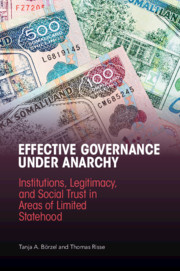 Effective Governance Under Anarchy
Effective Governance Under Anarchy from Part II - Governance in Areas of Limited Statehood: Empirical Evidence
Published online by Cambridge University Press: 09 April 2021
Chapter 6 investigates human rights, the rule of law, as well as participatory institutions. Democratic governance is possible, even if state capacities to enforce rules and decisions are weak or absent. We start by addressing the human rights problematique in areas of limited statehood. Strengthening state capacity might do human rights and the rule of law more harm than good, resulting in autocratic and repressive statehood. We explore the effectiveness of regional organizations (RO) and of (I)NGOs and non-state justice institutions to provide fair and transparent access to justice as a crucial component of the rule of law. They can accomplish these goals, the more their institutional design enables deliberative negotiations through fair and transparent procedures. The remainder of the chapter discusses the effectiveness of companies and rebel groups to engage in human rights and democratic governance. It is one thing to expect from companies to comply with human rights norms. It is quite different to ask them to promote human rights and the rule of law beyond their premises. Rebel groups are more likely to provide effective human rights and inclusive governance, particularly if they require international and domestic legitimacy and if they are faced with trust-based communities.
To save this book to your Kindle, first ensure no-reply@cambridge.org is added to your Approved Personal Document E-mail List under your Personal Document Settings on the Manage Your Content and Devices page of your Amazon account. Then enter the ‘name’ part of your Kindle email address below. Find out more about saving to your Kindle.
Note you can select to save to either the @free.kindle.com or @kindle.com variations. ‘@free.kindle.com’ emails are free but can only be saved to your device when it is connected to wi-fi. ‘@kindle.com’ emails can be delivered even when you are not connected to wi-fi, but note that service fees apply.
Find out more about the Kindle Personal Document Service.
To save content items to your account, please confirm that you agree to abide by our usage policies. If this is the first time you use this feature, you will be asked to authorise Cambridge Core to connect with your account. Find out more about saving content to Dropbox.
To save content items to your account, please confirm that you agree to abide by our usage policies. If this is the first time you use this feature, you will be asked to authorise Cambridge Core to connect with your account. Find out more about saving content to Google Drive.